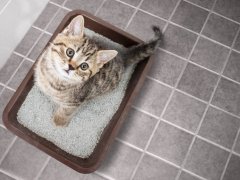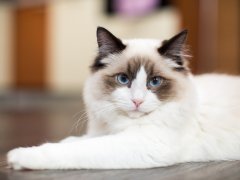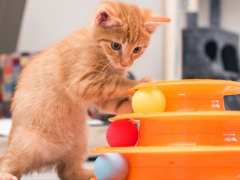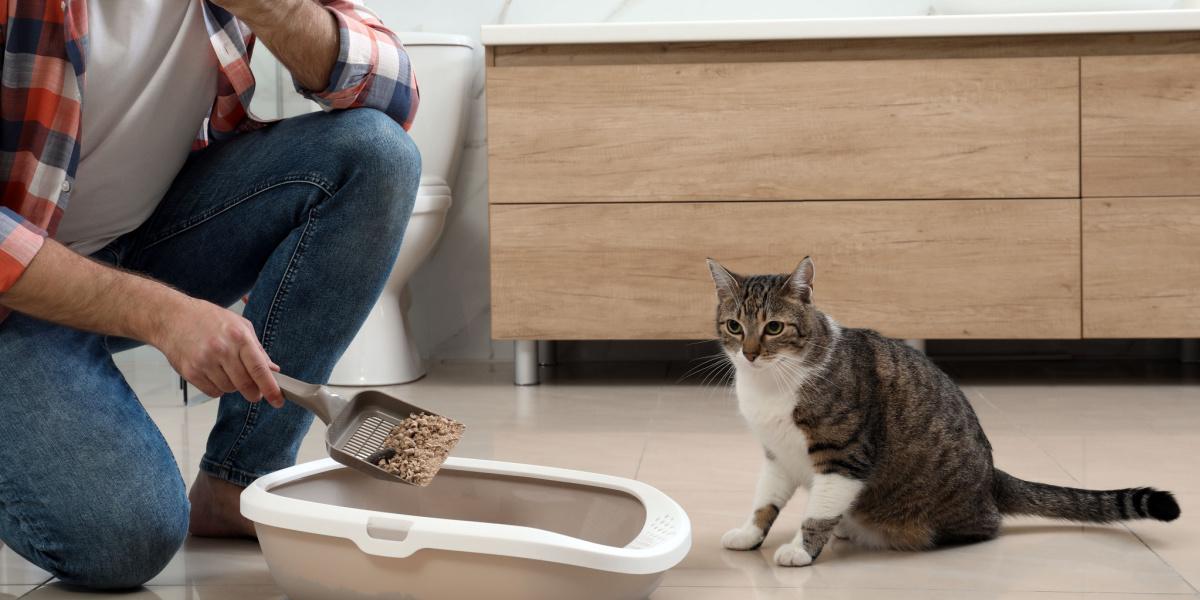
Poop stinks, right? Well, not always! A perfectly normal cat poop (yes, there is such a thing!) is small, compact and oblong, dark brown in color, firm in texture, and has a mild odor. Adult cats should usually pass these formed motions once or twice daily (kittens more than this), with little effort.
If your cat is passing foul-smelling feces, this may be due to multiple factors, including diet, infection, parasites, or medications. A stinky poop or two if your cat seems otherwise well is not really a cause for concern, but ongoing issues or other symptoms such as a change to the consistency or frequency of pooing may be worth investigation.
As carnivores, cats naturally have smelly poop, but particularly strong odors or changes in fecal odor can point to health issues. Remember that your cat's poop may not be the problem. Make sure you're using a great litter box and cat litter and cleaning it every day. If your cat's poop seems unusually smelly, especially if this coincides with any symptoms of illness, consult a veterinarian. Key Takeaways
Here are some reasons why the litter tray is giving off such an unpleasant odor.
1. Diet
Cats are obligate carnivores, dependent on animal proteins as a large part of their diet. Unfortunately, this protein-rich diet can lead to your cat’s stool being very smelly!
Cats who hunt a lot and supplement their diet with prey such as small birds and rodents tend to produce more foul-smelling poop. Cats need lots of protein in their diet as they are highly reliant on protein nutritionally, but unfortunately, this does make for some bad smells.
However, your cat may have other dietary concerns leading to smelly poop. The cheaper commercial cat food diets now widely available often contain lower quality ingredients as a filler. This can lead to your cat’s feces being bulkier with definite bad odors attached.
If your cat’s poop varies in how badly it smells, they may have food intolerances to one or more ingredients, leading to intermittent episodes of gut inflammation. This is common with cats fed milk, as most adult kitties cannot digest lactose, but cats can also have food allergies to other ingredients such as chicken or beef. There may be other symptoms such as vomiting, but some mild allergies just cause smelly poos.
2. A Digestive Disorder
If your cat has a problem with their gastrointestinal tract, there can be an array of symptoms, from vomiting and diarrhea to foul smells from the bottom end. Maldigestion and malabsorption are both conditions whereby food is not completely digested and therefore doesn’t undergo absorption through the intestines into the blood.
This leaves the cat with fewer nutrients to use, and also leaves undigested fats and starches in their poop. This is then a cause of stinky stools, with the resulting smelly feces often produced in large amounts, and of varying color and consistency. There may be weight loss, changes to appetite, and other symptoms alongside the foul-smelling feces.
3. Bacteria
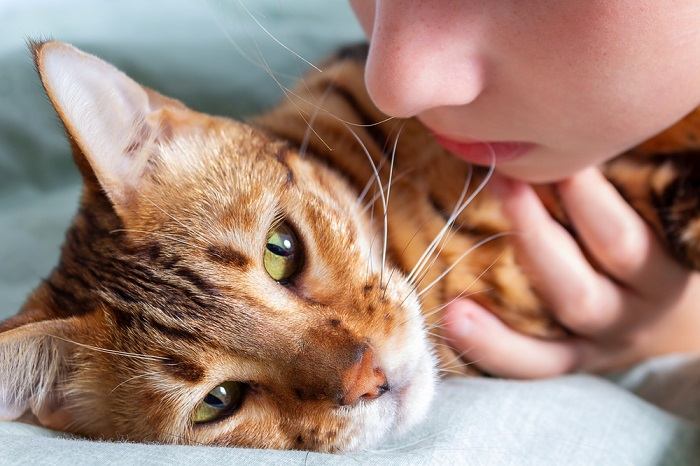
Some bacterial infections can also cause smelly poop.
Bacterial infection in the gastrointestinal tract can be a cause of smelly stools, often alongside other symptoms such as vomiting, gas, diarrhea and weight loss. Bacteria such as E. Coli and Salmonella may be to blame, but there are other potential bacteria that can cause problems.
These can be contagious to other pets and to humans, so if an infection is suspected, rigorous hygiene measures should be in place, as well as a trip to the veterinarian.
Anal gland infections can also be the cause of bad smells around the back end. The anal glands often release when your cat passes a motion, and so a foul smell may be linked to their poop, even if the origin is in the glands. Your cat may also be obsessively licking at their back end if they have an anal gland infection.
4. Parasites
Various intestinal parasites, such as Giardia, Coccidia and Trichomonas can also cause inflammation and damage to your cat’s intestines. Symptoms of parasitic infection vary, and can be solely smelly poop, but there may be other changes to your cat’s stool such as diarrhea or a change in color and consistency. These organisms are also contagious to pets and people, so hygiene is paramount alongside a check-up at the vet.
5. Digested Blood
If you see blood in your cat’s feces, you are likely to be concerned and seek advice from a veterinarian. However, digested blood is not always as easy to spot as you might think. It is often changed by the digestive process so is no longer bright red but instead very dark brown or even black.
It can make the feces sticky and tar-like, and also can have a distinctive metallic smell. If you think your cat’s poo smells oddly metallic, or the color and consistency have changed, your cat may have a gastrointestinal bleed and it is recommended to seek medical advice for them.
6. Medications and Supplements
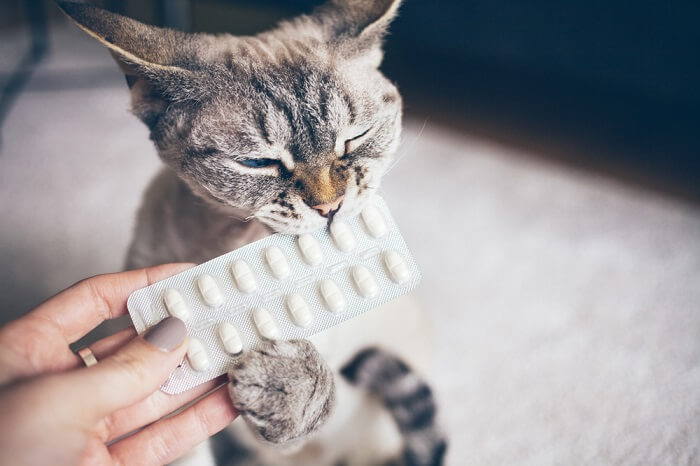
Certain medications and supplements can make your cat’s poop smell worse.
There are some feline medications, including things like vitamin supplements, which can alter the smell of your cat’s feces. It is unusual for these to significantly worsen the odor unless your cat is reacting badly to the medicinal ingredients, but it can cause a distinct change. If you are unsure whether this is the cause of your cat’s smelly poop, speak to a veterinarian.
7. The Cat’s Litter Box
This may seem obvious, but if you are noticing a bad odor, do check your cat litter and litterbox. Over time, remnants of toileting can become ingrained in the litterbox (especially plastic ones) and produce foul odors. Clean litterboxes regularly and dispose of dirty litter hygienically.
8. Individuality
In some cases, your cat may just have smelly poo! Really foul-smelling feces is always a cause for concern, especially alongside other symptoms, but some cats just have more nose-wrinkling toilet habits than others. Male cats are often blamed for smelly poos, but the girls can also be at fault!
What Should I Do About Smelly Poo?
If your cat has a sudden change to producing stinky poops, especially if this is alongside other signals of poor gastrointestinal health such as weight or appetite changes, vomiting, or diarrhea, seek advice from a veterinarian. They may recommend blood or fecal tests after examining your cat.
On the other hand, if your pet’s poops are just a little on the whiffy side, you could try gradually changing over to a high-quality diet, to see if this helps. Protein is important for cats, but very high protein levels can lead to smellier poops, so finding a good balance may be required.
Diets with plenty of fiber content will help improve gut health. There are also supplements, such as probiotics, that can assist in stabilizing the normal microorganisms which live in your cat’s gut, but speak to a veterinarian for advice before starting any additions to your cat’s diet.
Final Thoughts
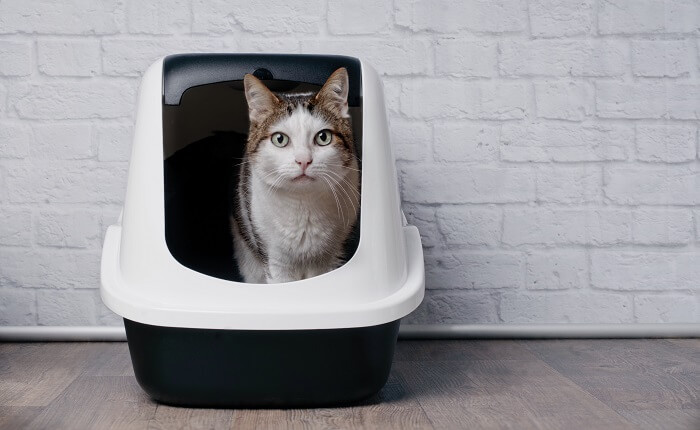
Fecal odor is natural for cats, but a particularly strong smell may point to issues that you can address with the help of a vet.
Carnivores, such as cats, tend to have smellier poo than herbivores, due to the high levels of protein. However, fecal odors shouldn’t be overtly foul in any species.
If your cat has stinky poop, this may be due to their diet or if they have any food intolerances, or a medical problem with the digestive tract, such as bacterial or parasitic infection. If your cat has smelly poos, or their feces have changed in size, amount, frequency, color or texture, then seek advice from a veterinarian.
Also Read: 6 Delicious Homemade Cat Food Recipes (Vet Approved)
FAQs
How can I make my cat’s poop less smelly?
If your cat has very smelly poo, it is worth ruling out digestive disorders, food allergies, bacterial and parasitic infections. Otherwise, trying changing your cat onto a diet with high quality, digestible protein.
Why does some cats’ poop smell worse than others?
Cats who hunt a lot, or who are on lower quality diets often have smellier poops. Cats with very stinky motions may be suffering from a problem with their digestive system, food allergies or an infection.
Why does my male cat’s poop smell so bad?
Cats poo tends to be smelly as there are carnivores. Very stinky poos can be caused by an unsuitable diet, food intolerances, digestive issues or infections.
Why do my cat’s poop and pee smell so bad?
Cats are carnivores, and the high levels of dietary protein can make their toilet quite smelly. Foul smelling poo can be the result of a poor diet, food intolerances, digestive issues or infections.



